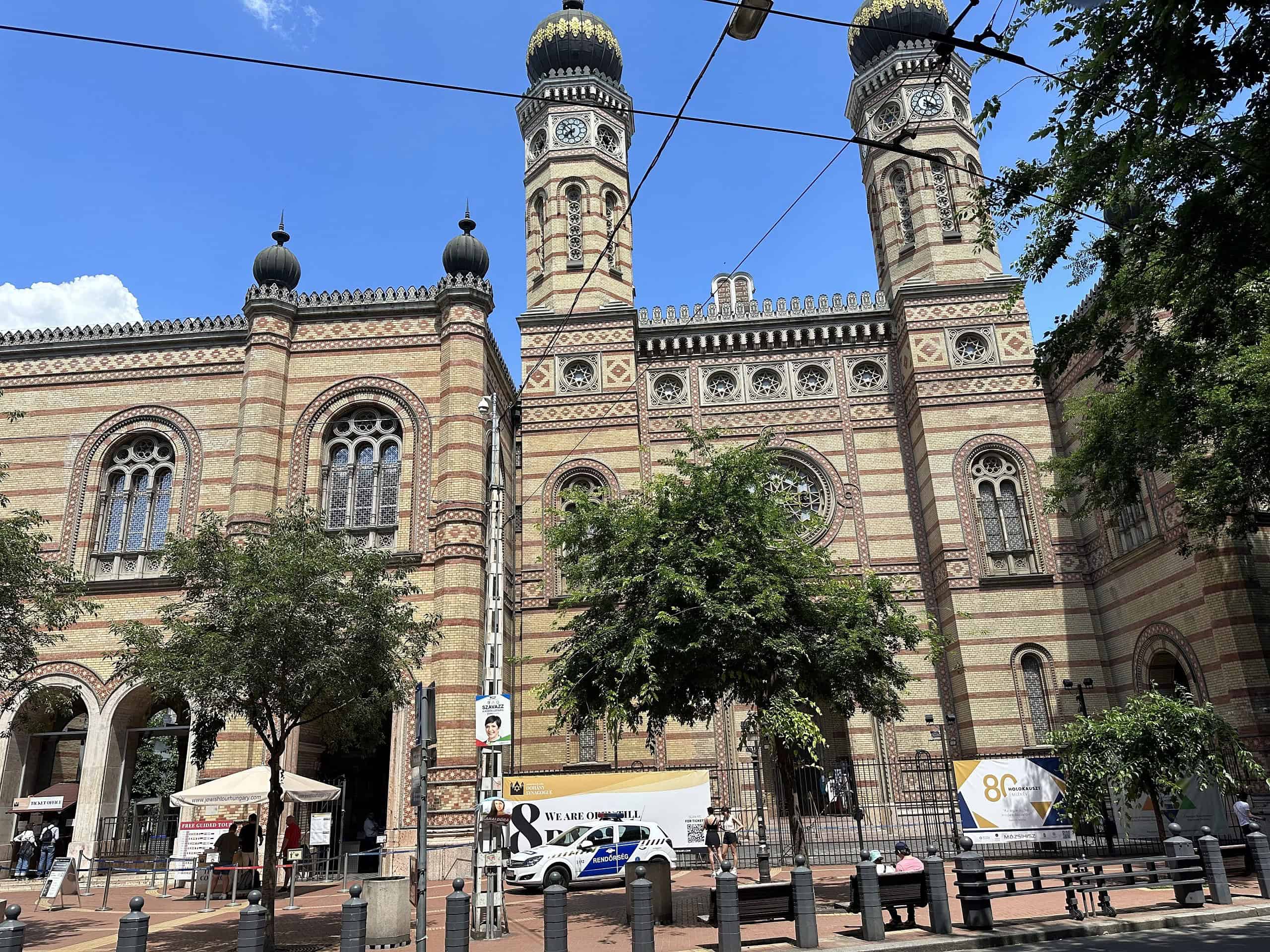This is a perilous time to be a Jew. The world responded to the greatest mass slaughter of Jews since the Holocaust with a surge of antisemitism and sympathy for those who committed the atrocities of Oct. 7, rather than its victims. Israel’s efforts to eradicate the genocidal terrorists of Hamas who launched that attack have not just been opposed but demonized in a way that enlightened liberal opinion did not condemn the orgy of murder, rape, torture, kidnapping and wanton destruction that occurred on that day.
And while Jews everywhere celebrated the heroic rescue of four hostages this past weekend by Israeli security forces, the same mainstream corporate media that has been acting as Hamas’s stenographers throughout the eight months of the current war reacted by emphasizing the deaths of the Palestinians holding them captive.
Yet as bad as the situation has become in the United States, where elite college campuses have become hotbeds of support for Hamas, it is arguably worse in Europe. It is not just a matter of the governments of Western Europe opposing Israel’s military campaign and seeking to prevent the defeat of Hamas in concert with the Biden administration. Spain, Norway and Ireland chose to reward the Palestinians for their terrorism by formally recognizing their fictional statehood. More than that, a sinister red-green alliance of leftists and supporters of political Islam has created a situation in which Jewish communities throughout the continent feel themselves under siege. Many are choosing not to wear religious markers such as kippahs and Stars of David, and still others have taken off the mezuzahs once affixed to their homes.
But not in Hungary.
Spend a week in that Eastern European country, as I just did, and the one thing you can count on is that you won’t see its landmarks being the site of mass demonstrations of supporters of jihad and Hamas terror, as is the case elsewhere, including the United States. That is something that would be unimaginable right now in America, but the reason is that the Hungarian government has banned pro-Hamas demonstrations. They’ve deemed it an open expression of antisemitism and a threat to public order. Their rationale is to treat pro-Hamas activism as morally equivalent to open advocacy for Nazism, which in Hungary and most other places in Europe is illegal.
A safe place in Europe
As I discovered in conversations with both liberal and Orthodox Jews, as well as non-Jews, the Jewish community in Budapest feels safe in a way that is not the case in London, Paris or Berlin. When you visit Hungary, no one tells you not to wear kippahs or Jewish stars in public. Orthodox Jews are not an uncommon sight on the streets of the Hungarian capital and act as if they have no fear of being attacked for their beliefs.
Meanwhile, the Hungarian government is easily the Jewish state’s best friend in Europe. As knowledgeable sources have made clear to me, Budapest is Jerusalem’s only reliable ally within the European Union, always ready to disrupt the E.U. Commission’s quest for consensus on behalf of its consistent anti-Israel agenda, sometimes displaying more willingness to fight supporters of the Palestinians than the Israelis themselves.
Understanding Orbán
What is the reason for this alliance that, at least on its surface, has little basis in the history of the Jewish experience in Hungary? It boils down to the decisions of a single highly controversial person: Hungarian Prime Minister Viktor Orbán.
Orbán, widely despised by American liberals, is routinely denounced as a tyrant and opponent of democracy, or as an ally of the even more-hated Russian President Vladimir Putin. He’s often accused of being an antisemite because of his long-standing feud with the Hungarian-born leftist billionaire George Soros, who remains a convenient punching bag for Orbán and his Fidesz Party. Fidesz is often likened to other right-wing populist parties that are on the rise in Europe. Such comparisons, as well as those of Orbán to former U.S. President Donald Trump or Israeli Prime Minister Benjamin Netanyahu, with whom he has close relations, are simplifications or just plain misleading. Love him or hate him, Orbán is a remarkable and singular figure. Though this is just one prism through which one can view him, his stance as a bulwark against European antisemitism needs to be both understood and appreciated.
His career began in the last decade of the Soviet Empire when, as a young law student and activist, he was part of the opposition to the Communist government. It is no small irony (and one that is often pointed out in debates about him today in Hungary) that he earned a scholarship to Oxford University in Great Britain—from the Soros Foundation since during that era, the billionaire’s philanthropy was primarily focused on promoting freedom behind the Iron Curtain. After the fall of the Berlin Wall and the birth of Hungarian democracy, Fidesz grew from its student-activist origins into a parliamentary faction that was considered a moderate liberal party. But under Orban’s leadership, it turned to the right on social issues while becoming populist in terms of its opposition to pure market capitalism.
In a stunning victory, Orbán led Fidesz to power for the first time in Hungary’s 1998 elections. He served as prime minister for four years in what was generally considered a successful term in office but failed to win re-election in 2002.

Not unlike Netanyahu, who also served a single term as Israel’s prime minister from 1996 to 1999 before being defeated, Orbán learned from his mistakes. His victory in 2010 was also similar to that of Netanyahu, whose return to power in 2009 was as much the function of the political incompetence and the abysmal policy failures of his opponents as his own brilliance, Orban became prime minister again after liberal leader and Prime Minister Ferenc Gyurcsány (whose wife, Klára Dobrev, who is Jewish, now leads one of the parties opposing Orbán) was caught on tape boasting of lying nonstop to the public to hold onto power.
Is he an authoritarian?
Since then, Orbán has consolidated and retained power by skillful maneuvering with the aid of wealthy supporters who dominate the Hungarian media. His government has been notoriously corrupt, though whether it is more corrupt than those in many other post-Communist nations (such as Ukraine, whose far more flagrant political and economic corruption has been ignored because of the Russian invasion) is debatable.
With only slightly more than three decades of experience as a free country, Hungary is far from being a perfect democracy. And while he is routinely denounced as an authoritarian, there are no political prisons or gulags in Hungary, and his opponents are free to denounce him wherever they like. Though Orbán ruthlessly uses the advantages of incumbency to keep winning elections to the dismay of foreign critics, his political opponents have gained ground in recent years and control the country’s largest cities, including Budapest.

Indeed, even as right-wing populist parties won victories across the continent in Sunday’s elections for the parliament of the European Union, Fidesz saw its margin of support reduced because of the emergence of a new party led by a former supporter Peter Magyar, who ran on an anti-corruption platform.
All of this means that for all its flaws, Orbán’s Hungary is a democracy. His supporters don’t dominate Hungary’s press to any greater degree than the left dominates the corporate media in the United States or Israel. That many of those who call him an authoritarian cheered on the Russia collusion hoax employed by Democrats to hamstring the Trump administration, the conspiracy of Internet moguls and mainstream media outlets to cover up evidence of Biden family corruption in the final weeks of the 2020 election and then the attempt by Democrats to bankrupt and then imprison the leader of the opposition to the current U.S. government (something Orbán has never stooped to) shows how lacking in credibility that charge truly is.
But if Orbán isn’t really an authoritarian, then why does the left hate him so much?
Part of it stems from a 2014 speech in which he said his vision for Hungary was for an “illiberal democracy.” Since then, neither he nor his allies have ever been able to adequately explain what that phrase meant. But suffice it to say that it represented a desire to push back against the free-market capitalist spirit that dominates the E.U., which, in the view of some of the union’s smaller countries, stands for the domination of the continent’s economy by Germany and other Western powers.
It also symbolizes his embrace of social conservatism. Hungary, like the rest of Europe, is afflicted by rapidly declining birth rates, as well as a collapse of faith in traditional values and faith. Orbán has prioritized policies that reward families for having more children, and he opposes the embrace of the LGBTQ+ agenda in a way that no other European or American leader has done. Still, there are no anti-gay laws or prohibitions, and discrimination on the basis of sexual orientation is illegal in Hungary. Yet unlike in the rest of Europe or the United States, public buildings in Budapest are not bedecked with rainbow flags during the gay-pride month of June.
But as grievous as that may be in the eyes of many people, it is his stand against unlimited immigration, especially from the Middle East and North Africa, that has earned Orbán the enduring enmity of liberals. While much of the E.U.—and specifically, Germany under the leadership of former Chancellor Angela Merkel—threw open the gates of their nations to largely Muslim emigrants and millions of refugees from the Syrian civil war in the 2010s, Orbán viewed this wave of immigration as a threat to Hungary’s identity and future.
While much of Europe is being transformed by mass immigration, Hungary has held the line against it and helped lead other Eastern European countries to do the same.

The difference in Hungary
With memories of the long Soviet occupation, as well as their nation’s heroic and tragic 1956 revolt against communism (during which the United States and NATO never lifted a finger to help them) not forgotten, it would be a mistake to see Orbán or most Hungarians having much sympathy for Putin or Russia. However, they also have the same history of resentment against Ukrainians and are deeply suspicious of the West. Their history as the only non-Slavic or Germanic people in the region, coupled with having a language that is unrelated to any other in Europe other than Finland, marks them as outliers.
That explains a lot about both their past (during which they suffered terribly during invasions of Europe by Mongols and Ottomans) and the present, including Orbán’s dubious decision to embrace China as an alternative to domination by Western Europe or the United States. Still, there is a common ground between the ideas that motivate Fidesz and that of other conservative movements around the globe, reflected in the work of the Danube Institute think tank, whose members I spoke with. Yet Hungary is a special and different place, and Hungarian policies and ideas should be viewed in their own context and not that of other nations.

The key is immigration
If you want to know why Hungary is a place where Jews live in safety when compared to nations like Britain and France, which are considered far more democratic by observers, a big part of the answer lies in Orbán’s immigration policies. If there is no red-green alliance in Budapest that can send throngs of protesters to the streets to intimidate both governments and Jews—as is the case in London and Paris—it is because there is no large Muslim immigrant community there that seeks to impose their culture and antisemitic views on their new homes.
Liberal observers viewed with alarm the gains of populist parties that are against unlimited immigration in the E.U. elections, as well as other recent votes. While some of these parties have roots in the continent’s fascist past, their popularity is based on the justified fears of people about their nation’s future so long as they cannot control their borders or prevent their heritage from being transformed into something they no longer recognize by Muslim immigrants who don’t share their cultural or political values.
To confuse opposition to Soros with antisemitism might be more understandable in Hungary with its unfortunate history. But there, the billionaire is a symbol not so much of Jewish villainy as of support for leftist policies that hurt Hungarians, much as his campaign to elect pro-crime prosecutors in the United States has done more damage to America than perhaps that of any other individual. To label Orbán an antisemite because of his Soros-bashing isn’t any more legitimate than when Democrats do the same to Republicans in the United States over their noticing the baleful influence of his massive giving to leftist (including anti-Israel) causes.
In Hungary, Fidesz joined with other parties to essentially drive the openly antisemitic Jobbik Party out of the mainstream in the last decade. Both Jews and non-Jews I spoke with conceded that antisemitism—which played a major role in the past there, and evidence of which is abundant in the Holocaust memorials in Budapest that commemorate the slaughter of most of its Jewish population in 1944—is far from dead in Hungary. Indeed, polls have shown that antisemitic attitudes are present in a significant percentage of the population and perhaps far higher than in other countries where Jews do live in fear.
An uncertain future
Hungarian Jews have a history of engagement with their nation. It was a stronghold of the Haskalah, or Jewish Enlightenment, in the 19th century as Jews embraced secular learning and integration into their host countries. The beautiful Great Synagogue in Budapest was built by and is still run by the Neolog movement, which is somewhat analogous to Conservative Judaism in the United States. Zionist leaders like Theodor Herzl (who was born across the street from the Great Synagogue) and Moses Hess were Hungarian.

While Orthodox Judaism is undergoing something of a revival there thanks to the brilliant outreach efforts of the Chabad-Lubavitch movement, which has close ties to Orbán, the majority of the approximate 100,000-strong Hungarian Jewish community are still loosely affiliated with the Neolog stream. The majority of them are politically liberal and oppose Orbán. But even liberal Jews told me that they understood that he was the main reason why antisemitism was kept in check and they are so secure. Though only a fool would underestimate or count him out, sooner or later, his time in power will come to an end. When that happens, Hungary’s status as a bright spot for Jews as well as a fiercely loyal ally of Israel will be in doubt.
For now, that means a stay in Budapest means encountering a nation where there is no sign of the antisemitic surge that is part of everyday life in Western Europe and even the United States.
Mass pro-Hamas demonstrations, such as the disgraceful orgy of Jew-bashing that took place last weekend across from the White House in Washington, D.C., or the besieging of a showing of a film about the attack on the Nova music festival in New York City don’t happen in Budapest. The capital’s synagogues don’t have to worry about antisemitic graffiti and the poster of the Israeli hostages taken by Hamas on the gates of the Great Synagogue hangs proudly and untouched by vandals. And rather than sniping at Israel or supporting efforts to criminalize its efforts to defeat Hamas and rescue its hostages, Hungary is holding the line in defense of the Jewish state.
To many who think Orbán is beyond the pale, his support for Jews and Israel is an unimportant detail. Yet at a time when Jewish lives and rights are at risk everywhere, to ignore the truth about Hungary and the Jews today would be as irresponsible as it would be self-destructive.


























